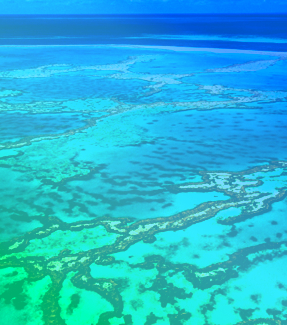Reef reports show state
 New reports provide an update on the current condition of the Great Barrier Reef, sounding an alarm about the potential irreversible impacts of climate change.
New reports provide an update on the current condition of the Great Barrier Reef, sounding an alarm about the potential irreversible impacts of climate change.
The Australian Academy of Science has published a report that asserts the iconic reef is on a trajectory to suffer irreversible damage around the middle of the century, irrespective of whether global emissions stabilise.
The report delves into various potential scenarios for the Great Barrier Reef under different emission levels.
Additionally, it pinpoints evidence-backed strategies and opportunities to safeguard the reef's ecosystem as it grapples with the relentless onslaught of climate change.
An aspect of particular concern is the ripple effect that climate impacts have on cultures and traditions. The report notes that these cultural shifts are both swift and largely unknown, making it challenging to prioritise interventions to protect areas of immense cultural significance to Indigenous communities.
The report suggests that integrating transdisciplinary knowledge could significantly enhance prioritisation processes.
The Australian Academy of Science orchestrated three roundtable discussions as part of the report.
These discussions brought together 84 multidisciplinary experts to assess potential outcomes for the Great Barrier Reef across three climate scenarios: near-term impacts, low-emissions trajectories, and high-emissions trajectories in the medium term.
Professor Chennupati Jagadish, President of the Australian Academy of Science, says that this report makes it unequivocally clear that climate change stands as the paramount threat to the Great Barrier Reef and its interconnected systems.
He emphasised that continuing on the current path, merely due to inertia, will not offer the best solution for the reef.
Professor Jagadish asserted that while there are opportunities to slow the reef's health decline in the medium term, decisive actions must be taken by Australia now.
The report further presents a range of promising opportunities, including a comprehensive review of the Great Barrier Reef's management system to better align it with the current understanding of climate change impacts.
It also suggests that research institutions could collaborate to establish sector-wide data standards, bridging existing and future research efforts for greater integration.
Addressing knowledge gaps, especially in high-emission scenarios, is also highlighted.
By filling these gaps, communities could be better prepared for the anticipated disruptions to their way of life.
The concept of clear communication takes centre stage in the report.
It emphasises the need for transparent, open, and honest dialogues with the public to prepare them for the evolving challenges the Great Barrier Reef faces.
Additionally, the Australian Institute of Marine Science (AIMS) has published its Annual Summary Report on Coral Reef Condition for 2022/23.
The report shows that hard coral cover across the Great Barrier Reef remains comparable to the previous year, though slight declines were observed in the Northern, Central, and Southern regions.
While some reefs have shown signs of recovery, the report highlights that this progress has been partly offset by coral loss in other areas.
Notably, the Northern and Central regions saw their highest recorded coral cover since monitoring began 37 years ago, thanks to a previous year's report.
The recovery trajectory was slowed by the 2022 mass coral bleaching event and other factors such as crown-of-thorns starfish outbreaks and a cyclone.
Experts stress that these findings reiterate the vulnerability of the Great Barrier Reef and its need for holistic intervention, encompassing global emission reduction and local management efforts.








 Print
Print